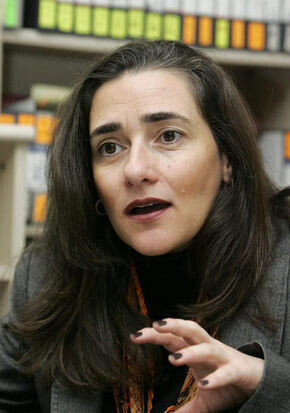hankyoreh
Links to other country sites 다른 나라 사이트 링크
Al-Jazeera visits joint North-South industrial complex

An Al-Jazeera TV crew visited the joint Korean industrial park in the North Korean city of Gaeseong (Kaesong). The satellite-broadcast station, based in Qatar, has aired a series of special programs on South Korea since last month, and plans to air the program about the Gaeseong Industrial Complex this week.
Maya Beydoun, 39, a producer and correspondent in charge of politics at al-Jazeera and reporter for the Gaeseong story, said that "the Gaeseong complex is an interesting and important test site for both South and North Korea. It's a place where two different economies meet, and it will help with reunification." However, while reporting the story, Beydoun was banned from directly talking with North Korean workers at the Gaeseong industrial park. In addition, she saw as a problem the fact that South Korean employers cannot directly pay North Korean employees their wages.
Also, Beydoun was surprised because workers from the South and the North took their meals at different sites at the industrial complex.
But while some conservatives in South Korea and the United States say the Gaeseong industrial park may provide hard currency for North Korea to build nuclear bombs, Beydoun said wages paid by South Korean companies would not be sufficient to aid in developing nuclear weapons.
In an interview with The Hankyoreh on November 28, Beydoun expressed her 'personal views' about South Korea, including inter-Korean relations, Seoul-Washington ties, the economy, and Buddhism. Born in Lebanon, Beydoun had worked for BBC before joining al-Jazeera 10 years ago.
During her time reporting in South Korea, Beydoun was surprised because South Koreans have little knowledge of the Middle East. For example, when she asked about the Palestinian matter, a South Korean questioned, "Is 'Palestine' the name of a hotel?" Also, when she said she came from Lebanon, another South Korean questioned, "Where is Lebanon?"
Beydoun positively evaluated South Korea's stance on relations with the U.S., saying that South Korea is trying to keep its independence in necessary matters. "Despite U.S. pressure, South Korea didn't give up the Gaeseong industrial park and has been trying to stick to its stance regarding the UN Security Council resolution and the Proliferation Security Initiative." The UN Security Council passed a strong resolution against the North following its October 9 nuclear test; South Korea has maintained it must be able to interpret the resolution in its own way, owing to the delicate nature of its relationship with North Korea. Seoul has said the same about the Proliferation Security Initiative (PSI), a U.S.-led international consortium aimed at reducing the spread of weapons of mass destruction.
Asked about the situation in Iraq and Lebanon, her face turned serious. "Iraq is really in a serious situation. While the U.S. claims it's not a civil war, how can we describe the current situation in Iraq if it is not a civil war? It's the same situation that we underwent in the civil war in Lebanon." Regarding South Korea's Zaytun forces stationed in Iraq, "They aren't engaged in combat and are working on reconstruction projects. There will be no big problem if 1,200 troops remain [in Iraq] after a reduction," she said.
Regarding to South Korea's plan to send peacekeeping forces to Lebanon, Beydoun said, "Personally, the UN has helped Lebanon's stability so far."
Beydoun returned to al-Jazeera's Qatar headquarters on November 30.
Please direct questions or comments to [englishhani@hani.co.kr]
Editorial・opinion
![[Editorial] Penalties for airing allegations against Korea’s first lady endanger free press [Editorial] Penalties for airing allegations against Korea’s first lady endanger free press](https://flexible.img.hani.co.kr/flexible/normal/500/300/imgdb/original/2024/0502/1817146398095106.jpg) [Editorial] Penalties for airing allegations against Korea’s first lady endanger free press
[Editorial] Penalties for airing allegations against Korea’s first lady endanger free press![[Editorial] Yoon must halt procurement of SM-3 interceptor missiles [Editorial] Yoon must halt procurement of SM-3 interceptor missiles](https://flexible.img.hani.co.kr/flexible/normal/500/300/imgdb/child/2024/0501/17145495551605_1717145495195344.jpg) [Editorial] Yoon must halt procurement of SM-3 interceptor missiles
[Editorial] Yoon must halt procurement of SM-3 interceptor missiles- [Guest essay] Maybe Korea’s rapid population decline is an opportunity, not a crisis
- [Column] Can Yoon steer diplomacy with Russia, China back on track?
- [Column] Season 2 of special prosecutor probe may be coming to Korea soon
- [Column] Park Geun-hye déjà vu in Yoon Suk-yeol
- [Editorial] New weight of N. Korea’s nuclear threats makes dialogue all the more urgent
- [Guest essay] The real reason Korea’s new right wants to dub Rhee a founding father
- [Column] ‘Choson’: Is it time we start referring to N. Korea in its own terms?
- [Editorial] Japan’s rewriting of history with Korea has gone too far
Most viewed articles
- 160% of young Koreans see no need to have kids after marriage
- 2Presidential office warns of veto in response to opposition passing special counsel probe act
- 3[Editorial] Penalties for airing allegations against Korea’s first lady endanger free press
- 4Months and months of overdue wages are pushing migrant workers in Korea into debt
- 5Japan says it’s not pressuring Naver to sell Line, but Korean insiders say otherwise
- 630th anniversary Wednesday Demonstration pushed out of memorial site by far-right
- 7Inside the law for a special counsel probe over a Korean Marine’s death
- 8Dermatology, plastic surgery drove record medical tourism to Korea in 2023
- 9[Guest essay] Maybe Korea’s rapid population decline is an opportunity, not a crisis
- 10Trump asks why US would defend Korea, hints at hiking Seoul’s defense cost burden